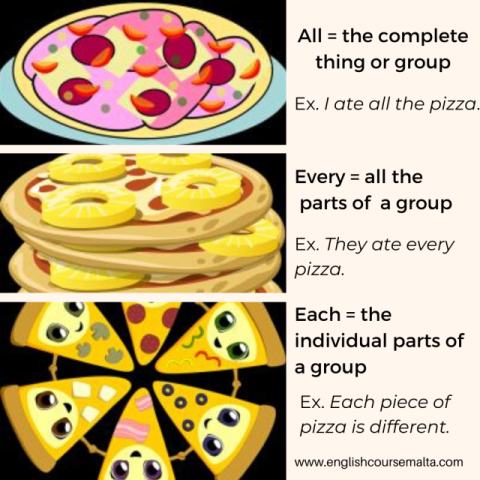ALL (OF) = the whole or complete group
EVERY = each item / object / person in the group
Note that ALL is used with plural nouns while EVERY and EACH are used with singular nouns.
ALL or EVERY? Compare the following example sentences:
- All my friends love pizza. / Every friend I have loves pizza.
- All dogs love meat. / Every dog loves meat.
- She knows all the songs written by Justin Bieber. / She knows every song written by Justin Bieber
- I’ve visited all (of) the countries in Europe. / I’ve visited every country in Europe.
- I’ve watched all (of) the film last night. / I’ve watched every film with Tom Hanks.
Note you cannot say:
- I watched every the film last night.
- Every my friend loves Malta.
It is not possible to use words (i.e. Determiners) as the, a/an, this / that, yours, his, etc. with EVERY or EACH.
 Difference between all and every
Difference between all and every
In the examples above ALL and EVERY are used in a way that the sentences have the same meaning. But this is not always the case. Compare the following:
- All the lesson was boring. (One lesson. The complete or whole lesson was boring.)
- Every lesson was boring. (3 or more lessons. There were some lessons and they were all boring.)
- The children ate all the cake. (One cake. The children ate the complete cake.)
- The children ate every cake. (3 or more cakes. The children ate all the cakes.)
All is typically used with plural and uncountable nouns. In examples 1 & 3 above, lesson and cake are uncountable.
Complete this online exercise below using ALL or EVERY.
Download PDF worksheet and exercises.
You will find more on this topic by following this link.
RELATED TOPICS
COUNTABLE AND UNCOUNTABLE Nouns Exercise
COUNTABLE & UNCOUNTABLE NOUNS Grammar
